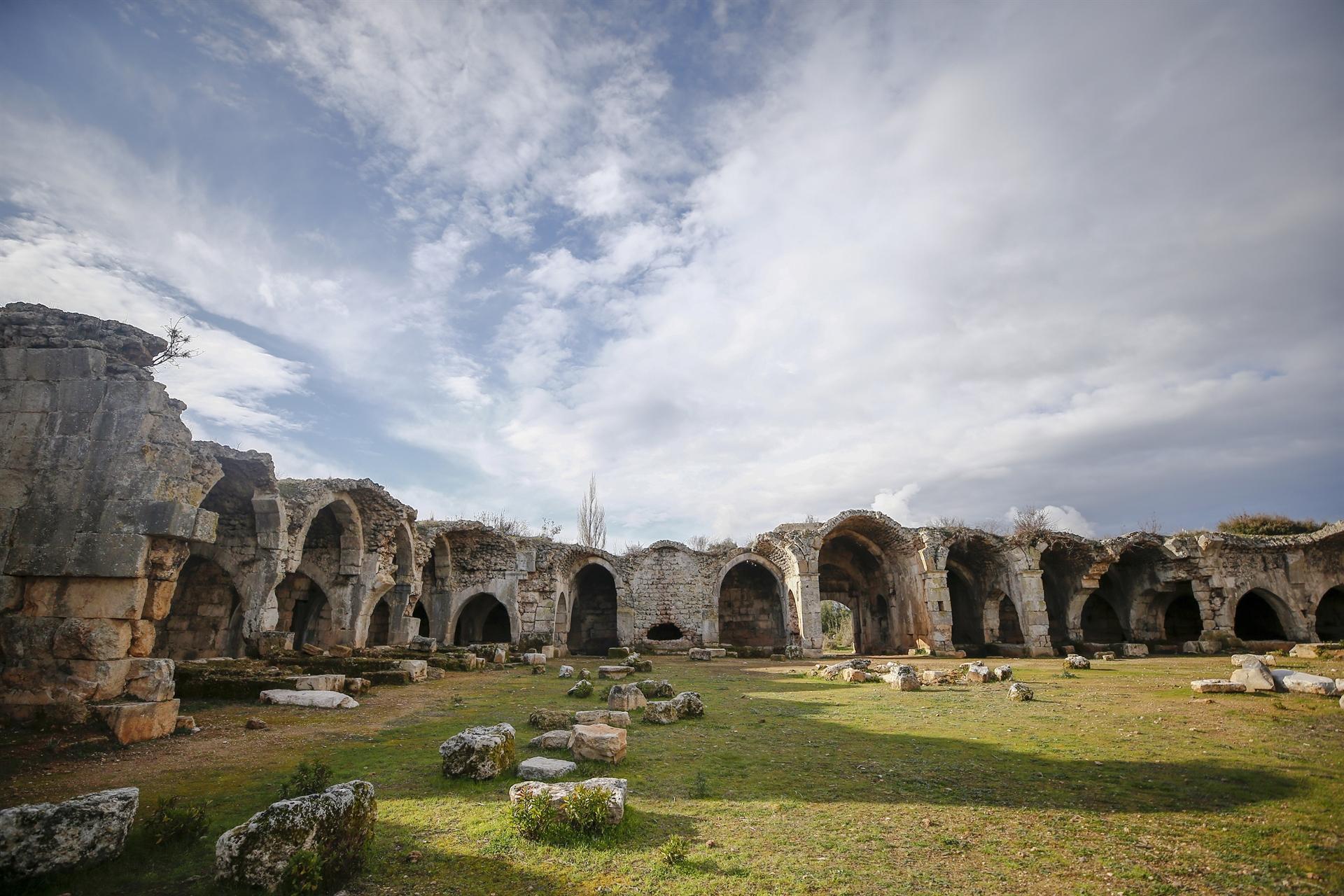Capital of tourism attracts with its inns
ANTALYA

The historical inns in the southern province of Antalya, called “the capital of tourism” in terms of the number of tourists it welcomes, attract visitors, too. With the highest number of hotels and 42 percent of a total of 1.2 million bed capacity in the country, Antalya lures tourists from 193 countries.
The inns in different parts of the city, shown as one of the most important tourism destinations in the world for its beaches, coves, service quality in hotels, historical and cultural values, are also drawing tourists. The inns, which were mostly built during the Seljuk period, are located in important centers of social and commercial life and carry the traces of history. Some of the inns, where passengers accommodated in the past, have been restored and still survive.
Speaking to the state-run Anadolu Agency, Antalya Governor Münir Karaloğlu said that Antalya is growing in tourism, welcoming more tourists every year. “Just as people carry the genetics of their ancestors, there are some features in the DNA of the cities, and even if you cover it with ashes, one day it shows itself again,” he said.
 Stating that the route from west to east of Antalya was an important trade center during the Seljuk period, Karaloğlu said that this road went from Konya to the coast, and from the coast to Burdur and Isparta. Drawing attention to the fact that inns and caravanserais were built on this trade route at that time, Karaloğlu said, “The inns and caravanserais of that time were the hotels of today. They were built for travelers to rest and get some sleep. We describe exactly today’s tourism.”
Stating that the route from west to east of Antalya was an important trade center during the Seljuk period, Karaloğlu said that this road went from Konya to the coast, and from the coast to Burdur and Isparta. Drawing attention to the fact that inns and caravanserais were built on this trade route at that time, Karaloğlu said, “The inns and caravanserais of that time were the hotels of today. They were built for travelers to rest and get some sleep. We describe exactly today’s tourism.”
The governor said that Antalya was an important Seljuk city and that the city was conquered in 1207, adding that there were very important inns in the Teke region, which was the center of Antalya, where Isparta and Burdur were also connected.
Antalya has important inns such as Evdirhan, Kırkgözhan, Alarahan, Yenice Han, Serapsu Han and Kargıhan, he said. “There is Susuzhan inn in Burdu’s Bucak district. A benefactor has completed its restoration, is a beautiful inn and still used. There is also İncirhan inn in Bucak. These are connected to Antalya; they were located on trade routes at the time. Seljuk positioned the inns as follows: Inns are built on a distance that a caravan will take on the road. After walking out of an inn and walking one day, one should rest in a second inn.”
Stating that there are Giyaseddin Keyhüsrev inn in Eğirdir district of Isparta and Ertokuşbey caravanserais in Gelendost district, Karaloğlu said, “Ertokuş Bey was the first governor of Antalya and served for 17 years. He is the governor who got many Seljuk buildings built in Antalya, Isparta and Burdur.”
Contribution to cultural tourism
Alarahan, located in Çakallar neighborhood of Alanya district, is a building that was built during the Seljuk period. The inn, which has a six-line inscription on the crown gate, has an important place among the Anatolian Seljuk caravanserais. Apart from the eastern façade covered with rubble stone, the three other façades were built with smooth cut stone and were rented in 1998 for a 49-year period with the “restore-operate-transfer” model, but the inn was evacuated last year.
 Serapsu (Sarapsa) Inn in Konaklı district of Alanya was built in the period of Giyaseddin Keyhüsrev. It is located on the road extending to the south of Anatolia and there is a five-line construction inscription written on a white marble above the crown gate of the inn. The inn, which was restored in 1992 and rented out for 10 years, is still serving.
Serapsu (Sarapsa) Inn in Konaklı district of Alanya was built in the period of Giyaseddin Keyhüsrev. It is located on the road extending to the south of Anatolia and there is a five-line construction inscription written on a white marble above the crown gate of the inn. The inn, which was restored in 1992 and rented out for 10 years, is still serving.
It is believed that Kargıhan in Beydiğin district of Manavgat dates back to the 13th century. There is a bath in the southeastern part of the inn, which is in the caravanserai group. Restorations still continue in the inn.
Evdirhan, located in Döşemealtı district and built on the ruins of the ancient city of Lageon during the Anatolian Seljuk period, has a different plan scheme among the inns of that period. According to the inscription, the inn was commissioned to be built by Sultan İzzettin
Keykavus.
Kırkgözhan in Döşemealtı Bıyıklı neighborhood is the second stop after Evdir on the Antalya-Konya caravan road.
The inn, which is said to be built in 1236-1237, was leased for 29 years in 2005. The inn serves culture tourism as a place where historical movies and TV dramas are shot.
Yenice Han, which was built by Murat Pasha in the late 16th century in Korkuteli district, is waiting to be restored.

















